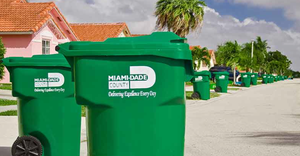Court Strikes Down Mass. Town’s Attempt to Block Alternative Hauling Mode
March 5, 2015
“I think I can, I think I can, I think I can,” puffed the small blue locomotive in the Platt & Munk version of The Little Engine That Could enjoyed by generations of children. A recent Massachusetts court decision would give the venerated story a different twist with the little engine adding, “But if I’m stuck, we’ll hire a truck.”
For more than a quarter century, the town of Yarmouth shipped solid waste from its transfer station to a waste-to-energy facility in Rochester under a contract with the Bay Colony Railway (BCR). At the time, BCR, by lease agreement with the Commonwealth, operated several rail lines in southeastern Massachusetts, including routes between the town and Rochester. However, in the fall of 2007, the state notified BCR that, effective December 31, 2007, it would terminate BCR's lease of the Cape Cod rail lines, which meant that railroad could no longer transport the town's waste to the facility.
As BCR saw it, all was not lost. The contract with the town provided that, if and when the Commonwealth ended BCR's lease, the company had a choice: either to assign the contract outright to the successor railroad lessee or to continue transporting the waste under the contract “[by] an arrangement with the successor operator or by other modes of transportation.” BCR notified the town that it intended to continue to transport waste using “other modes”—namely, by truck rather than rail. The town, for its part, had a different idea. It signed a new waste transportation contract with the Massachusetts Coastal Railroad (MCR), which had been awarded BCR’s former lease.
BCR went to court, arguing that the town had breached the contract by terminating the railroad’s right to transport the waste. BCR sought and received a judicial declaration that the contract gave BCR “the right to assign its interest or fulfill the agreement by alternate … transportation.” After a trial, a jury found that the town had ignored the contract, and awarded BCR damages of $800,000.
On appeal, the town claimed that state law prohibited BCR from transporting the town’s waste by truck after it lost its rail lease, that the town’s state-issued transfer station permit banned long-term waste transportation by truck, and that the town had no contractual obligation to seek a modification of its permit to allow such truck transport. The case reached the state’s supreme judicial court, which rejected the town’s arguments and affirmed the judgment.
Massachusetts law forbids a railroad from operating trucks for the transportation of freight in areas that the railroad does not serve by rail. Thus, the town contended that BCR could not lawfully perform the contract by truck after it lost its rail line lease because it would be transporting freight by motor vehicle where it had no rail service.
The situation, however, was not quite that simple. In 1994, Congress completed the deregulation of the trucking industry by passing a law providing that no state could enact or enforce a law affecting a price, route or service by any motor carrier transporting property. Over the years, courts interpreted the law permitting the regulation of waste collection under traditional police powers. But the Massachusetts high court noted, the state’s “railroad-operated motor vehicle restriction … does not regulate local waste collection … [and] is not limited to trucks transporting waste.” The state law “is an economic regulation relating to railroads and motor carrier services rather than a public health regulation relating to the transport of waste,” the judges said. “Consequently, the town’s defense that it was barred by [state law] from allowing [BCR] to transport its waste to the facility by truck … fails as a matter of law.”
In addition, the appeals court found sufficient evidence for a jury to reject the town’s defense that it could not allow BCR to truck its waste under its state permit. “The implied covenant of good faith and fair dealing obligated the town to make a good faith effort to apply for a modification of its permit and such a modification likely would have been allowed if sought.”
Bay Colony Railroad Corp. v. Town of Yarmouth, 470 Mass. 515 (2015)
Barry Shanoff is a Rockville, Md., attorney and general counsel of the Solid Waste Association of North America.
About the Author
You May Also Like




